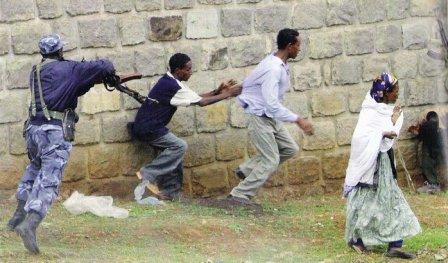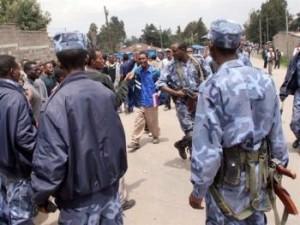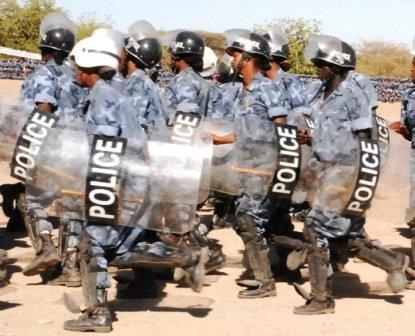
image credit: soderetube.com
Criminals and Crime in Ethiopia
In most capitals, street violence is common, but the crime rate in Addis Ababa is lower than almost anywhere in Africa.
Ethiopian criminals are not known to be violent; crime in Ethiopia is normally opportunistic, non-violent and non-confrontational. In fact, Ethiopian criminals are more inclined to act in a covert and sly manner leading them to be more likely to pick your pockets or break into an empty home than commit an aggressive act.
There of course has been the odd violent crime here and there. A little while ago, thugs were arrested in the Bole area for cutting the fingers of a young girl while trying to steal her jewelry.
What makes this tragedy even worse is that the contract taxi drivers who work in the area just sat in their cars and watched. They too were charged for aiding and abetting.
This is an oddity as one of the major deterrents of crime in Ethiopian society has always been mob justice. If a thief is caught red handed in public then expect him to be handed over to the police beaten to a pulp.

I am not condoning this type of behavior, as we cannot expect the public to be judge, jury and executioner but it has its merits as an effective deterrent.
Incidents targeting foreigners is also on the rise. Pick pocketing has always been the main crime experienced by foreigners in Ethiopia. Snatching items from the victim's hands or from their vehicles and running away is also fairly common, but violence is usually unheard of.
That is why incidents such as what happened to a journalist working for the Economist is a cause for concern.
A few weeks ago, walking back from my gym in Addis Ababa in the early evening, I was robbed. My rucksack contained most of my valuables: laptop, wallet, smartphone, interview notes. The gate to the compound where I live was open, and the guard was distracted by a punch-up across the street. Seizing the opening, two men followed me down the driveway towards the house, jumped on my back in the dark, suffocated me, grabbed my bag and emptied my pockets as I lay passed out on the road.
Nowadays, with the increase in the number of automobiles and motorcycles on the streets of Ethiopia, a new crime wave is being initiated. The Toyota Vitz is so common on the streets today, that telling your car apart from the others in a busy parking area would pose quite a daunting challenge for many Vitz owners.
Criminals in the Wollo Sefer area have been reported using these seemingly anonymous vehicles to abduct and sexually assault young female pedestrians.
Another crime trend receiving a lot of attention lately has been the motorcycle robberies taking place in busy parts of town.
The method is almost always the same; two thugs seated on a motorcycle will pull up fast to an unsuspecting victim on the road. The thug in the back seat then proceeds to snatch what he can, usually something held in the hands of the victim at the time of the attack.
Items such as purses, smartphones, laptops, and jewelry are the most common targets. They take what they can and are gone in a flash.
This usually takes place with the sun setting in the late afternoon following the rush hour chaos; making it that much more difficult for investigators to pursue.
These cases are just examples of what is beginning to look like a crime wave, almost everyone in Addis Ababa has either personally experienced or has heard of these incidents.
Although, minor theft such as this should not be a cause for great concern, there is an increase in the number of violent crimes associated with this type of thievery. Muggings can quickly turn violent leading to bodily injury or even worse; death. It has been reported that there is indeed an increase in the number of deaths linked with random robberies.
Criminal investigators are left to play catch up to these new and innovative tactics being employed by these unlawful miscreants. Yet in still, systems put in place such as the ever invasive CCTV cameras are no doubt being used to put a dent in the sinister plans of the criminals conducting these vile affairs.

image credit: awrambatimes.com
For the moment though, a majority of the crimes that are being thwarted is apparently by good old fashioned "snitching". It is plausible to believe that citizens reporting suspicious activities has been one of the cornerstones that has kept Ethiopia relatively crime free.
Not too long ago, a large counterfeiting operation was shut down due to a report by a neighbor. This counterfeiting operation in Ethiopia was fairly sophisticated; they falsified court documents, university degrees, made counterfeit Ethiopian birr as well as fake dollars, and even had weapons stashed.

The suspects had eluded the authorities for quite some time, but were taken down due to the simple but effective "snitching" by a neighbor reporting suspicious activity at the house.
Most developed nations have citizens do their best to avoid crime scenes and investigations by the police, while Ethiopians on the other hand see no wrong in "dropping the dime" on their fellow wrong doers.
It is widely believed that a country's urbanization and its crime rate go hand in hand. As one increases so does the other. Addis Ababa used to be a place where the society was very closely attached. People generally knew one another. But that is not the case today, with Ethiopia's massive development efforts, its huge increase in population size, and urban migration.
As the society becomes more affluent, people are moving out of neighborhoods they grew up in and renting homes across the city. This was rare in the past and families are more divided and spread out.
The combination of all this has lead to a society that is more welcoming for its deviants, those searching for unlawfully opportune moments.
In light of this, Ethiopians are becoming more reliant on an effective police and security agency. The local emergency line is 991 and it will connect you with the EFP or the Ethiopian Federal Police.

They are responsible for crimes that fall under the jurisdiction of federal courts, including any activities in violation of the Constitution that may endanger the constitutional order, public order, hooliganism, terrorism, trafficking in persons, and transferring of drugs. The EFP also safeguards the security of borders, airports, railway lines, mining areas, and other vital institutions of the federal government.

image credit: bilaltube.com
Let us hope that the EFP is sophisticated enough to stay one step ahead of today's ever changing and pioneering criminals.
Travelling out of Addis Ababa
UPDATED: THE SITUATION HAS CHANGED GREATLY SINCE THE NEW REFORMS ENACTED BY PM ABIY AHMEDWhen travelling away from Addis Ababa, the roads are generally considered safe for locals and foreigners. Mainly border regions should be avoided due to reasons listed below.
Ethiopia/Eritrea Border (northern Ethiopia)
Ethiopia and Eritrea signed a peace agreement in December 2000 that ended their border war but the border remains disputed and is a militarized zone. The possibility of armed conflict exists.
It is not advised to travel these routes:
North of the Shire-Axum-Adigrat road in Tigray.
North of the road from Dessie through Semera to the Galafi border crossing with Djibouti.
The Danakil Depression and the Erta Ale volcano.
In January 2012, a group of foreign tourists were attacked near the Erta Ale volcano in the Afar region near the Eritrean border about 100 miles southeast of Adigrat in the Danakil Depression. The attack resulted in five deaths, three wounded, and four people kidnapped. The victims were European and Ethiopian citizens. Two kidnapped Europeans were released. On February 15, 2012, Ethiopia, which blamed Eritrea for the attack, retaliated by striking Eritrean military camps where the attackers were allegedly trained. This episode illustrates the continuing volatility of the border area.
Somali Region (eastern Ethiopia)
Since the mid-1990s, members of the Ogaden National Liberation Front (ONLF) have conducted attacks on civilian targets in parts of the Somali regional state. Expatriates have been killed in these attacks.
In 2010, the government initiated peace talks with the ONLF that are ongoing. Despite these talks, incidents of violence continue. Throughout 2013, skirmishes between the ONLF and regional government security forces took place. Some of these incidents involved local civilians.
Al-Shabaab maintains a presence in Somali towns near the Ethiopian border, presenting a risk of cross-border attacks targeting foreigners.
Gambella/Benishangul-Gumuz Regions (western Ethiopia)
Sporadic inter-ethnic clashes are a concern throughout the Gambella region. While the security situation in Gambella town is generally calm, the rest of the region remains unpredictable.
Intensified conflict between Sudan and the Republic of South Sudan has significantly increased refugee flows into western Ethiopia. Ethiopian refugee camps are strictly controlled.
Travel to the border areas in the Beneshangul Gumuz Region (Assosa) is not advised due to political sensitivity to major towns north of the area where the Great Ethiopian Renaissance Dam (GERD) is being constructed.
Ethiopian/Kenyan Border (southern Ethiopia)
Along the Kenyan border, banditry and incidents involving ethnic conflicts are common. Security around Moyale is unpredictable, and clashes between Ethiopian forces and the Oromo Liberation Front (OLF) have been reported.
